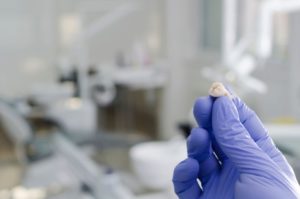
Gum disease is a serious oral health condition that can adversely affect your ability to eat your favorite foods and smile with confidence. It can even cause the teeth to become loose. If you have been struggling with it for a while, you might be thinking about getting your teeth removed. But do tooth extractions actually cure gum disease, or is there another reason why they are often included in a periodontal (gum) treatment plan? Continue reading to find out.
Are Extractions a Treatment for Gum Disease?
Gum disease, also known as periodontal disease, is an infection in the pinkish tissue that surrounds the teeth. In its advanced stage, it can also attack the underlying jawbone, causing it to shrink and weaken. However, gum disease does not affect the teeth themselves. Therefore, removing the teeth will not directly address the gum infection.
Why Do Dentists Often Remove Teeth in Cases of Advanced Gum Disease?
Even though extractions are not a direct way to address gum disease, they can play an important role in a periodontal treatment plan. They can accomplish the following:
- Enhance patient comfort. If advanced gum disease has caused your teeth to become loose, you may find it extremely uncomfortable to eat. You may also be self-conscious about your appearance. Removing the teeth can give you a “clean slate” to work with.
- Reduce the risk of infection. If your teeth are extremely loose, they might eventually fall out on their own. Getting them professionally removed instead may significantly reduce your risk of infection.
- Clear the way for treatment. Removing the teeth can make it easier to rid the mouth of your infection. Bacteria tend to collect in the pockets that form between the teeth and gums in advanced cases of gum disease. Removing the teeth makes room for treatments that can get rid of those bacteria and open the way for you to enjoy a disease-free mouth.
Replacing Teeth After Extractions
If your gum disease necessitates one or more tooth extractions, do not be too discouraged. Ask your dentist about your tooth replacement options. Once your mouth has been declared free of any active infections, you may be able to move forward with dental implants, which are extremely lifelike and have the potential to last for several decades. Dentures and fixed bridges are also viable options for many patients.
Tooth extractions do not cure gum disease, but they can help you move toward a healthier smile. Your dentist will help you compare your treatment options and make a wise decision about how to reclaim your oral health.
Meet the Practice
The experienced team of general dentists and specialists in our practice is always eager to help patients prevent or treat gum disease. If you are concerned about the state of your gums, we are ready to evaluate the situation and make a treatment recommendation. Contact our Abington dental practice at 781-780-2658.
